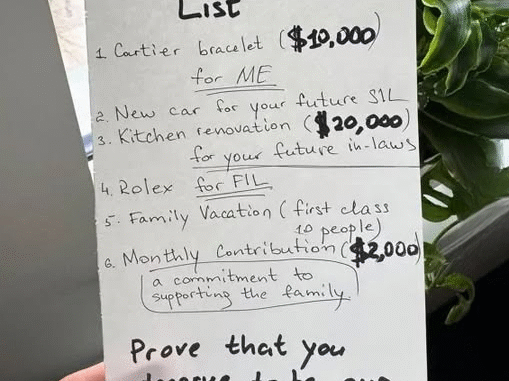
When my uncle’s inheritance came through, my future mother-in-law, Tricia, handed me a list of lavish gifts I “owed” to join her family. I thought I was marrying into love, but her greed showed me the truth. My response? A lesson she’d never forget.
Brandon and I had built a life together over four years. Our small Chicago apartment, shared with our cat, Milo, was filled with cozy nights and plans for a future. When he proposed, I said yes, my heart full. Then my uncle passed away.
His death broke me. He’d been my rock, the one who taught me to stand tall. “Maya,” he’d say, “you’re tougher than you know.” His $400,000 inheritance was his final gift, a safety net I hadn’t expected.
I was still grieving when Tricia, Brandon’s mom, got wind of the money. Suddenly, her distant politeness turned calculated.
At a family brunch, she pulled me aside, her smile too bright. “Maya, you’re joining us soon. We need to talk about your place in the family.” She handed me an envelope.
I expected a kind note. Instead, it was a list of demands—gifts I was to provide to “earn” their acceptance.
My hands shook as I read: a $15,000 designer bag for Tricia “to show devotion”; a motorcycle for Brandon’s sister, Chloe; a $25,000 “family fund” for home upgrades; a luxury watch for Brandon’s dad; a week-long cruise for the family; and $1,500 monthly “dues” for their lifestyle.
“This is a joke, right?” I said, voice tight.
Tricia’s eyes gleamed. “Not at all, dear. It’s tradition. If you love Brandon, you’ll do this.”
I swallowed my anger, forcing a smile. “Family matters. I’ll take care of it.”
She beamed, thinking she’d won.
That evening, I showed Brandon the list. Milo napped nearby as I laid it on the kitchen table. “Your mom gave me this.”
He frowned, scanning it. “She’s just… enthusiastic. You don’t have to do all this.”
“Enthusiastic?” I said. “This is extortion.”
He sighed, rubbing his temples. “She means well. They’ve had some financial stress.”
“Stress doesn’t justify this,” I said. “She’s treating me like a bank, and you’re okay with it.”
“Maya, don’t overreact,” he said. “Let’s just talk to her.”
His dismissal stung worse than the list. “Fine,” I said. “I’ll handle it.”
He nodded, relieved, unaware I was planning something bigger.
The next weekend, I arrived at Tricia’s with a bag of “gifts.” Her eyes lit up as I handed them out: a thrift-store purse for her, a toy motorcycle for Chloe, a cheap digital watch for Brandon’s dad, a pamphlet for a local boat tour, and a play-money check for $25,000.
Tricia’s face fell. “What’s this nonsense?”
“Gestures,” I said, smiling. “You said it’s about the sentiment, not the price, right?”
Her voice shook. “This is disrespectful!”
“No,” I said, “disrespect is demanding a fortune from someone grieving to ‘buy’ family acceptance.”
Brandon stepped in. “Maya, you’re making a scene.”
I turned to him. “No, your mother did. She saw my inheritance as her jackpot, and you didn’t stop her.”
I slid off my engagement ring and set it on the counter. “I deserve a family that values me, not my money.”
Tricia gasped. Brandon stammered, “Maya, wait—”
“I’m done,” I said, walking out.
At the apartment, I packed Brandon’s things—clothes, books, gadgets—into cardboard boxes. Milo watched, tail flicking. Brandon came home early, eyes wide.
“What are you doing?” he asked.
“You’re moving out,” I said, folding his jacket. “Milo stays.”
“We can fix this,” he pleaded. “Mom was wrong, but I love you.”
“You let her treat me like a transaction,” I said, meeting his gaze. “Love doesn’t look like that.”
He texted for days—apologies, promises. His last message: “I messed up. Can we try again?”
I didn’t respond.
Tricia posted online, calling me selfish. I didn’t care. I used the inheritance to buy a small house, a sanctuary for me and Milo, free from greed.
That was my true inheritance: the strength to walk away.